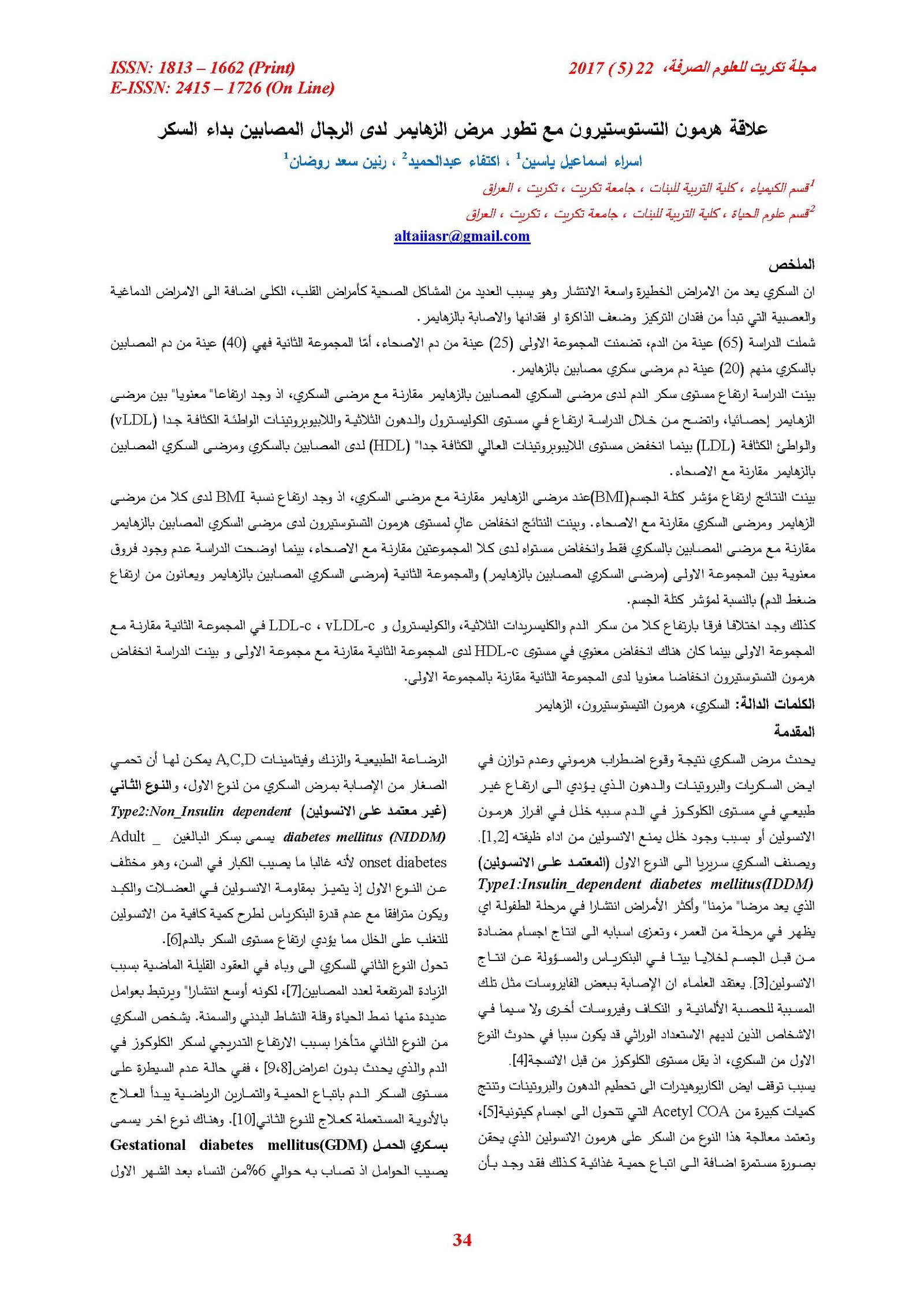Relationship Testosterone with the development of Alzheimer's disease in men with diabetes
Main Article Content
Abstract
That diabetes is a serious disease is widespread, a gate opens many health problems such as heart disease, kidney addition to that, it is a serious alarm for the brain and nervous start from the loss of concentration and poor memory through decline into the abyss of Alzheimer's.The study included 65 blood sample, which included the first group (25) a sample of the blood of healthy people, while the second group are (40) blood samples from people with diabetes were (20) patients with the blood of diabetes patients with Alzheimer's sample.
The study showed the high level of blood sugar in diabetic patients with Alzheimer's compared with diabetic patients, as it found a rise significantly among Alzheimer's patients statistically significant, and it turned out through the study, an increase in the level of cholesterol and triglycerides and very low density lipoprotein (vLDL) and the low-density lipoprotein (LDL) while high density lipoprotein level (HDL) decreased with diabetes and diabetic patients with Alzheimer's compared with healthy people.
The results showed high level body mass index (BMI) in the Alzheimer's patients compared with patients with diabetes, and found a high of BMI among both Alzheimer's patients and patients with diabetes compared with healthy people. The results showed higher low level of testosterone in diabetic patients with Alzheimer's compared with patients with diabetes only low level among both groups compared with healthy people, while the study found no significant differences between the first group (diabetic patients with Alzheimer's) and second group (diabetic patients with Alzheimer's and suffering from high blood pressure).
Article Details

This work is licensed under a Creative Commons Attribution 4.0 International License.
Tikrit Journal of Pure Science is licensed under the Creative Commons Attribution 4.0 International License, which allows users to copy, create extracts, abstracts, and new works from the article, alter and revise the article, and make commercial use of the article (including reuse and/or resale of the article by commercial entities), provided the user gives appropriate credit (with a link to the formal publication through the relevant DOI), provides a link to the license, indicates if changes were made, and the licensor is not represented as endorsing the use made of the work. The authors hold the copyright for their published work on the Tikrit J. Pure Sci. website, while Tikrit J. Pure Sci. is responsible for appreciate citation of their work, which is released under CC-BY-4.0, enabling the unrestricted use, distribution, and reproduction of an article in any medium, provided that the original work is properly cited.
References
1. King, M.W. (2004). "Medical Biochemistry". Academic Excelience, pp. 1171-175.
2. Nathan, D.M. (1996). " The pathophysiology of diabetic complications How much does the glucose hypothesis explain". Annals of internal Med 124: 86-88.
4. Nelson D. L. and Cox M.M. (2005). "Lehninger principles of biochemistry". 4nd ed., Worth publishers, USA, PP. 790-885 .
5. Murray R.K., Granner D.K., Mayes P.A. and Rodwell V.W. (2003). "Harpers Biochemistry". 26th ed., Appleton and Lange, USA, pp : 257-266 .
6. Orbak R. Simsek S., Orbak Z., Kavrut F., and Colak M. (2008). "the Influence of Type-1Diabetes Mellitus on Dentition and Oral Health in Children and Adolescents". Yonsei Med J. 49(3): 364.
7. Fernandez M. A., Kim K. J. ,Yakar S., Dupont J., Hernandez-Sanchez C., Castle A. L., Filmore J. , Shulman G. I. and Le Roith1 D. (2001). "Functional inactivation of the IGF-I and insulin receptors in skeletal muscle causes type 2 diabetes". GENES & Development 15: 1926 .
8. Yehuda, H. (2009). "A Doctors Diagenosis prediabetes power of prevention", Vol. 1(2).
9. Mealey B. L. and Ocampo G. L. (2007). "Diabetes mellitus and periodontal disease". Periodontology. 44: 128.
11. Koya D., Hayashi K., itada M., Kashiwagi A., Kikkawa R. and Haneda M(2003). "Effects of Antioxidants in Diabetes-Induced Oxidative Stress in the Glomeruli of Diabetic Rats" J. Am. Soc. Nephrol., 14: S250-S253.
12. Juliette, J.; Thomas, L.; Joseph, E. P.; Peter, O.; Ronald, C. and Peter, C. (2004) " Increased Risk of Type 2 Diabetes in Alzheimer Disease" Diabetes; 53(2): 474-481
14. Weiten, W. Lloyd, N.A (2000) Psychology Applied to Modern.
15. Reber, A.S. (1995), Penguin Dictionary of Psychology, London.
16. Sara Fino, E.P., (1998), Health Psychology, John Wiley and Sons, New York.
17. Tietz, N.W.(1999). "Text book of Clinical chemistry" 3rd Ed., C.A. Burtis, E.R.O Ashwood ,W. B.S aunder, pp.809-856.
18. Bendlin, B.; Madison, W.; Sam G.(2015) "the Study of Alzheimer's Disease", Manhasset, JAMA Neurology, online
19. Walton, C (2015) "High blood sugar may contribute towards Alzheimer's disease, new study finds" Alzheimer's Society.
20. Henry, H.; Ruiz, T. C.; Andrew, C. S.(2016) "Increased susceptibility to metabolic dysregulation in a mouse model of Alzheimer's disease is associated with impaired hypothalamic insulin signaling and elevated BCAA levels". Alzheimer's & Dementia.
21. Kimura, R.; Takeuchi, T; Shimizu, M. (2008) " Prevalence of Alzheimer's disease with diabetes in the Japanese population" Psychogeriatrics, 8(2):73-78.
22. Pratishtha, C.; Wei, L.F. Lim, G.(2016) "Plasma Phospholipid and Sphingolipid Alterations in Presenilin1 Mutation Carriers: A Pilot Study". Journal of Alzheimer's Disease.
23. Naderali, E.K.; Ratcliffe, S.H.; Dale, M.C. (2010)" Obesity and Alzheimer's disease: a link between body weight and cognitive function in old age" Am J Alzheimers Dis Other Demen. ;24(6):445-9.
24. Chuang, Y.F; An, Y.; Bilgel,M. et. al. (2015) "Midlife adiposity predicts earlier onset of Alzheimer’s dementia, neuropathology and presymptomatic cerebral amyloid accumulation" Molecular Psychiatry. 25. Low Testosterone Linked to Alzheimer’s Disease. Oct. 5, 2010. Science Daily. 26. Kharrazian, D.(2010)" Investigating the Role of Testosterone in Alzheimer’s Disease". Neurotransmitters and the Brain., M Neuro Sci. 27. Jovinelly, J. (2015) "Type 2 Diabetes and Hypertension" health line
28. Beauchet, O.; Celle, S.; Roche, F.; Bartha, R.; Montero-Odasso, M.; Allali, G.; et al. (2013). "Blood pressure levels and brain volume reduction: a systematic review and meta-analysis" J. Hypertens. 31, 1502–1516.
29. Chu, L-W. et al. (2010) "Bioavailable Testosterone Predicts a Lower Risk of Alzheimer’s Disease in Older Men". Journal of Alzheimer's Disease, 21 (4), 1335-45.
